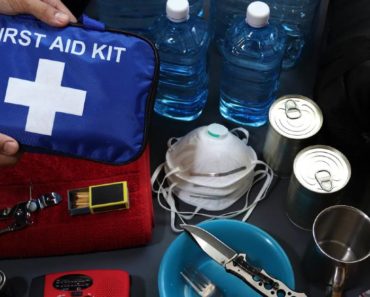One of the most important and least talked about parts of survival is your mental attitude. Every military manual you open on survival starts out with a chapter talking about the survival mentality. Considering that the military can spend pretty much whatever they need on the creation of those manuals, if they say something, we should probably pay attention.
Putting it simply, a survival mentality is all about believing that you can and will survive. That’s important when you’re going through it, as you have to believe that what you’re doing in order to survive is going to make a difference in order to motivate you to do it. Let’s face it survival is difficult at best, so it is easy to become discouraged when things don’t seem to be going right.
That discouragement is something we all need to avoid. Just as motivation is critical for the effectiveness of the soldier, so it is with the survivalist. So, just how do we keep that motivation?
First of all, we need to be motivated before we even start. As part of our training and preparation, we need to be building up our confidence and our will to live. When a disaster strikes, we need to be as motivated as a football player when they run out on the gridiron. Any survival situation is “game on” for those of us who prepare, and that’s exactly the way we need to approach it, even though survival is much more serious than the Sunday game.
One thing that helps build up that level of motivation is to build up your confidence and one of the greatest ways of building up your confidence is to train. Fighter pilots, whether in the Air Force or the Navy, are some of the most egotistical people there are, each one convinced they are the best there is. That’s actually encouraged by the respective services because they know that the attitude of being the best or even being invincible helps them do their jobs.
Bringing that down a notch to something that we can relate to a little more, Special Forces troops (and other “snake eater” organizations) display that same attitude without the fighter jet strapped to their backs. While they really aren’t highly trained in survival, as some would like you to think, they are experts at guerrilla warfare and training the indigenous people of whatever country they are in, in the fine art of guerrilla warfare.
So how do fighter pilots and Special Forces troops get that way? Through their training. The real difference between any military personnel and civilians is their training. And the difference between elite troops and any other troops is also their training. The more training one receives in their area of specialty, the more confidence they have in their ability to do what’s needed when the time comes. This works not only for military personnel but brain surgeons, Olympic athletes, and people just trying to survive a disaster as well.
Let’s Take a Step Back
There are those for whom what I just wrote may actually be too much. Chances are, you’re not one of them, but there’s always a chance that someone in your family is. There are a lot of underlying thought processes, insecurities, and mental conditions that could make it extremely hard for someone to gain that confidence and motivation. This isn’t to say that they could never gain it, just that they don’t have that within themselves.
We’ve all heard the “glass full/glass empty” thing, referring to optimists and pessimists. But there are more categories of people than just these two. There are probably countless different ways that we can
categorize people. Some of those are important when it comes to survival. Here are some characteristics of people who will have an extra struggle to overcome their character so that they can develop the necessary confidence and motivation:
- Pessimists – It’s hard to be positive and optimistic about your chances of survival when your basic attitude is negative.
- Low Self-esteem – This is the opposite of what those fighter pilots and Special Forces troops are afflicted with. People with low self-esteem are likely to say, “it can be done… by others… but not me.”
- Insecure – Insecurity is not the same as low self-esteem. While it can be uncertainty about one’s self, it can also be uncertainty about others.
- Lack of Confidence – It is possible to have good self-esteem but still have low self-confidence, especially if one is unsure about their ability to react properly to a particular situation or need to accomplish a particular task.
- Panic Prone – Survival requires keeping a cool head and thinking things through. Panic is the enemy, leading to wasting time and energy on counter-productive activities.
- Worriers – Spend so much time thinking about everything that can go wrong that they don’t have time to look at what can go right.
- Lazy – Ok, we can all be lazy at times; but I’m talking about the person who puts more effort into trying to get out of doing things, than the effort required to do them.
- Self-centered – These people will try to make sure that everything is done to their benefit, even to the point of allowing others to suffer for it.
This list probably isn’t complete, but I hope you can see a general trend in these characteristics… basically, they’re all about looking at one’s self and one’s situation in a negative light. People with these characteristics have to struggle to overcome them so that they can have the necessary confidence for survival.
The good news is that these things can be overcome if one truly wants to and is willing to put in the necessary mental effort to do so. We have this amazing ability to convince ourselves of literally anything; that’s why some people can lie and convince themselves that they’re telling the truth. Well, if that works for them, it can work for us as well. The difference is that instead of telling ourselves that something different happened than what actually did, we convince ourselves that we are a different sort of person than we previously realized.
You’ve got to understand whether you have the confidence or not; whether you have solid self-esteem or not; even whether you are a pessimist or an optimist are nothing more than thought patterns. As such, they can be “overwritten” and replaced with new thought patterns. In doing so, you end up changing your very character.
Don’t just stop with yourself, though; the same thing needs to happen with every member of your family. They’re not going to do it on their own without your help. You’ve at least got to get them started on that road, convincing them that it is to their benefit to change their thought patterns and get out of the negative mindset.
The problem here is that many people think in terms of “this is just how I am, and I’ll never change.” No, they won’t change until they believe that they can. That’s the hard part, convincing them that they actually can change. But I’m a living testament that it can be done. If you can convince those family members that they can change, you’ve already accomplished the hardest part.
But Then There Are Others
While most people, maybe even almost all people, can change their negative attitudes, some will refuse to do so. There are also people with more deep-seated problems, which can’t be solved by just a change in attitude or thoughts. What do we do when we have people like that in our families?
When I think about this group of people, the main thing I think of is the privileged person who thinks that everyone else is there for their convenience. We’ve all seen people like this, demanding to see the
manager in some restaurant or store. Can you imagine them coming to you all the time, demanding that you change things around for their convenience? Can you imagine them complaining about the survival tasks they have to do? I sure can.
This is getting into a very difficult area and one that most people avoid touching, yet I feel I need to, as there are those out there who need some advice.
We have to realize that this is family members we’re talking about. That means you’re going to have some responsibility towards them. But just how far does that responsibility go? Do you sacrifice your own life just so they can live? Do you do that, even though you know that without you there to keep them alive, they won’t survive either?
To many, the other extreme doesn’t even bear consideration; that of abandoning them to die so that you might live. I personally couldn’t do that, but I recognize that there are those who can or who would be quick to do so, believing that in doing so, they were doing what they had to do to guarantee their own survival.
Granted, there are those who won’t survive, no matter what we do. Medical or mental conditions, possibly requiring medication, will make it impossible for them to survive long without a constant supply of their meds. That’s a sad reality to have to face, but it’s one that some of us need to consider.
Even though I’m no psychologist, I have taken the time to evaluate the mental condition of every member of my extended family from a survival viewpoint. I look at a combination of their personality, their survival skills, and how willing they are to work. By doing that, I have a pretty good idea of how much effort it is going to take on my part to keep them alive, over and above what I would need to keep myself and my wife alive.
A few family members turn out to be a net gain, as they would be good workers, trying to do everything they could to help, even if they don’t know what to do. Several fall into the category of being a net wash, meaning that they won’t contribute much, but it will be enough so that I’m not killing myself to keep them alive. Then there are those few who would be nothing but a pain in the wherever; they won’t really contribute, and they will require a lot of maintenance. For whatever reason, those are the problems.
So, how do I plan on dealing with them? It’s going to have to be a dose of hard reality. To be part of my survival team, which is built around my extended family, they’re going to have to contribute just as much as anyone else. I’ve told them that ahead of time, and I’ll reinforce the statement when the time comes.
As hard as it sounds, the reality is that none of us can afford dead weight in our survival teams. The decision might boil down to letting one person go, telling them they aren’t welcome or putting everyone else at risk. My responsibility is to the team or family as a whole, not just to that one person. I can’t put everyone else at risk for them. As hard as that is, it’s reality.




























